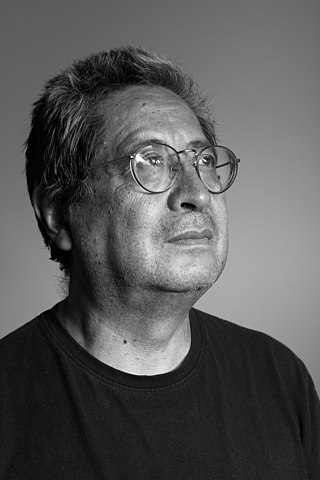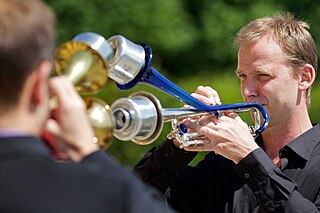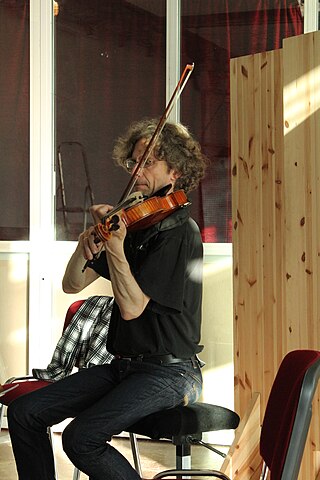
James Tenney was an American composer and music theorist. He made significant early musical contributions to plunderphonics, sound synthesis, algorithmic composition, process music, spectral music, microtonal music, and tuning systems including extended just intonation. His theoretical writings variously concern musical form, texture, timbre, consonance and dissonance, and harmonic perception.
Guy Klucevsek is an American-born accordionist and composer. Klucevsek is one of relatively few accordion players active in new music, jazz and free improvisation.
Philip Lionel Corner is an American composer, trombonist, alphornist, vocalist, pianist, music theorist, music educator, and visual artist.
Earle Brown was an American composer who established his own formal and notational systems. Brown was the creator of "open form," a style of musical construction that has influenced many composers since—notably the downtown New York scene of the 1980s and generations of younger composers.
Kontra-Punkte is a composition for ten instruments by Karlheinz Stockhausen which resolves contrasts among six instrumental timbres, as well as extremes of note values and dynamic levels, into a homogeneous ending texture. Stockhausen described it: "Counter-Points: a series of the most concealed and also the most conspicuous transformations and renewals—with no predictable end. The same thing is never heard twice. Yet there is a distinct feeling of never falling out of an unmistakable construction of the utmost homogeneity. An underlying force that holds things together—related proportions: a structure. Not the same Gestalten in a changing light. But rather this: various Gestalten in the same light, that permeates everything."

Mesías Maiguashca is an Ecuadorian composer and an advocate of Neue Musik, especially electroacoustic music.
Stephen Whittington is an Australian composer, pianist, teacher and writer of music.
Hans G Helms was a German experimental writer, composer, and social and economic analyst and critic.
Dietmar Bonnen is a German composer and pianist.
Experimental music is a general label for any music or music genre that pushes existing boundaries and genre definitions. Experimental compositional practice is defined broadly by exploratory sensibilities radically opposed to, and questioning of, institutionalized compositional, performing, and aesthetic conventions in music. Elements of experimental music include indeterminacy, in which the composer introduces the elements of chance or unpredictability with regard to either the composition or its performance. Artists may approach a hybrid of disparate styles or incorporate unorthodox and unique elements.

The Ensemble Musikfabrik is an ensemble for contemporary classical music located in Cologne. Their official name is Ensemble Musikfabrik Landesensemble NRW e.V..

Marco Blaauw is a Dutch trumpet soloist known for his work in the field of new music and with Cologne-based contemporary music group Ensemble Musikfabrik. He plays a double bell trumpet, an invention that has allowed for numerous new compositions for trumpet, including those by Ernst von Siemens Music Prize winner, Rebecca Saunders. Blaauw is a consistent faculty member at the Darmstadt Summer Course, the Stockhausen Courses Kürten, the Lucerne Festival, and the Chosen Vale International Trumpet Seminar.

Refrain for three players is a chamber music composition by Karlheinz Stockhausen, and is number 11 in his catalog of works.

Harlekin (Harlequin) is a composition for unaccompanied clarinet by Karlheinz Stockhausen, named for the commedia dell'arte character Harlequin. It was composed in 1975 and is Number 42 in his catalogue of works. A shorter, derived work called Der kleine Harlekin is Number 42½.
Kumiko Omura is a Japanese composer in the field of contemporary instrumental and electronic music.

Ensemble is a group-composition project devised by Karlheinz Stockhausen for the 1967 Darmstädter Ferienkurse. Twelve composers and twelve instrumentalists participated, and the resulting performance lasted four hours. It is not assigned a work number in Stockhausen's catalogue of works.
Matthias Kaul was a German percussionist and composer of classical music.

Vincent Royer is a French violist and composer.
Rolf Riehm is a German composer who wrote stage and orchestral works as well as music for ensembles and solo instruments. He began as an oboist and music teacher and was later a professor of music theory at the Hochschule für Musik und Darstellende Kunst Frankfurt am Main for several years.
Nicola Jürgensen is a German clarinetist and academic teacher. She played principal clarinet with the WDR Symphony Orchestra Cologne from 2001 to 2018, and has been professor of clarinet at Folkwang University of the Arts in Essen from 2018. She is active internationally as a soloist and chamber music player, and has made recordings. Besides the traditional repertoire, she is focused on contemporary music. She performed on stage in a production of Karlheinz Stockhausen's Michaels Reise um die Erde in Vienna and New York City, among others.








